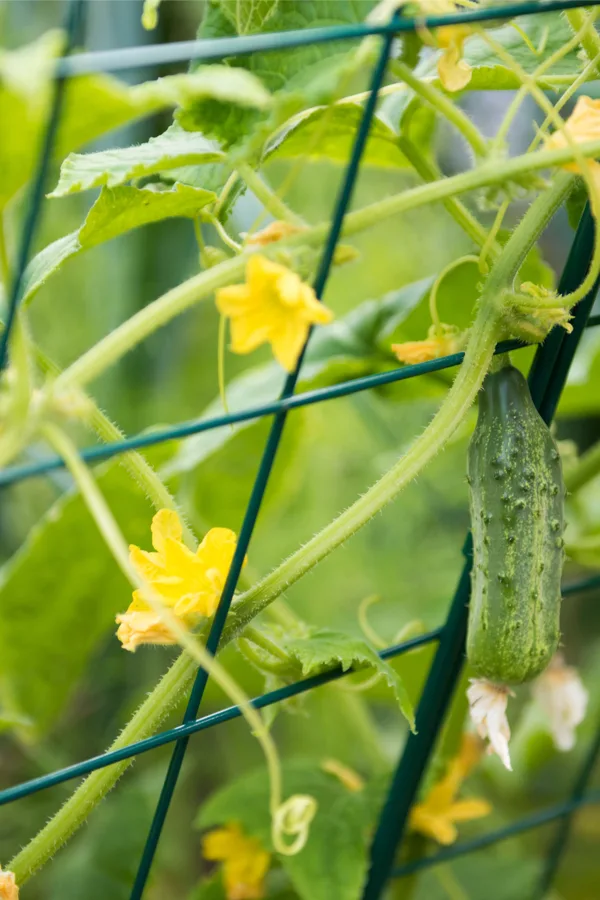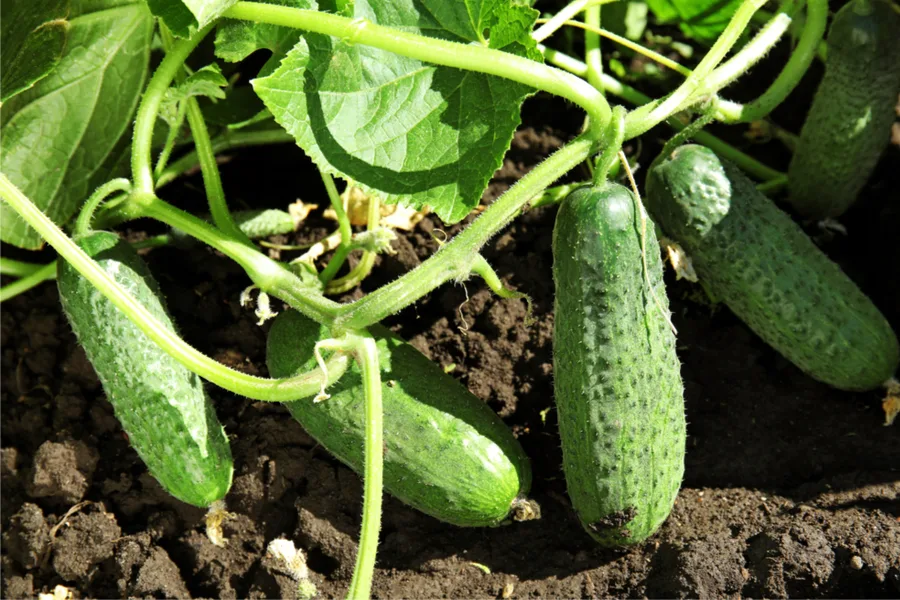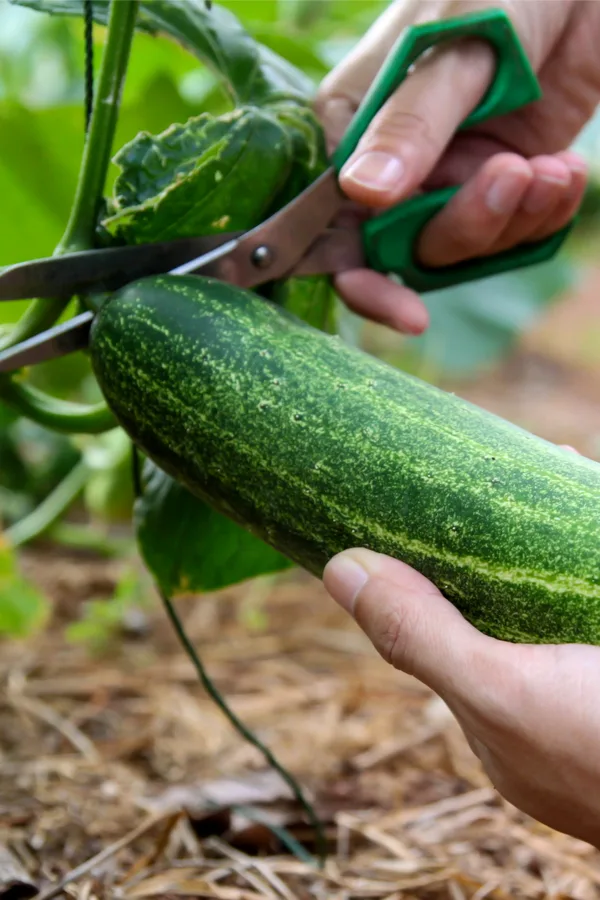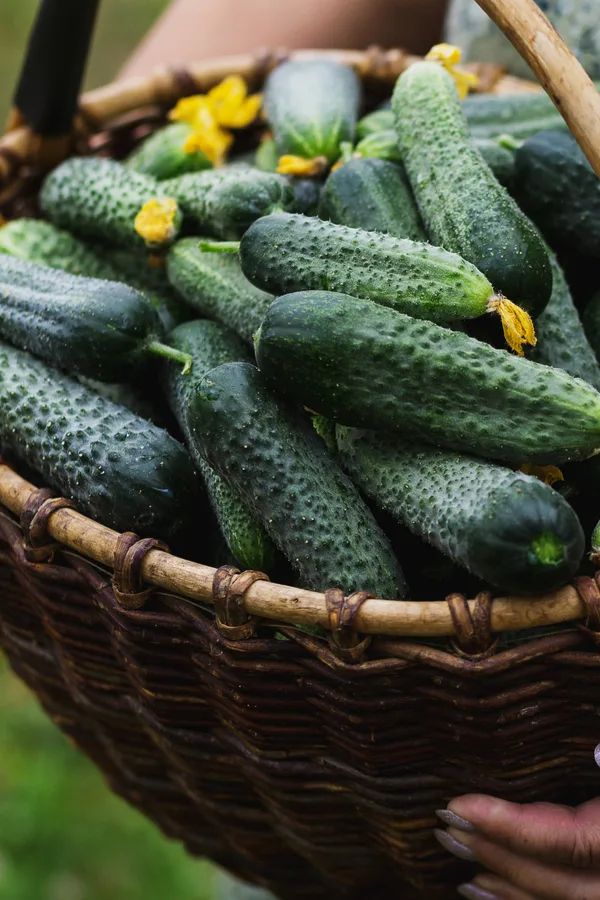When it comes to keeping your cucumber plants producing a steady supply of fresh cucumbers, a few little tips and tricks can make all the difference in plants that continue to bloom and bloom – or having ones that fade away fast.
There is nothing quite like the taste of a fresh cucumber. And whether you grow your cukes in a traditional garden setting, raised bed, or in containers or straw bales, getting more of them is never a bad thing.
Unfortunately, for many gardeners, keeping their cucumber plants productive can be a challenge as spring rolls into mid summer and beyond. Quite often, at this point, plants that were once producing loads of blooms and fruit begin to slow their production. But as you will see below, it doesn’t have to mean the end of fresh cucumbers.

How To Keep Your Cucumbers Plants Producing
As summer arrives in full force, there are three main factors that can all play an equal role in how your cucumber plants perform. Those factors are:
- How much water and moisture are available to your plants.
- The amount and availability of nutrients your plants can access.
- When and how you harvest your cucumbers.
When each of the three factors above are successfully maintained and performed, cucumber plants will continue to flourish. But let just one slip a bit, and your cucumber plants can begin to suffer quite quickly.
With that in mind, here is a look at how to best perform each of the three points above, and how to make sure your cucumber plants have everything they need to stay strong all summer long!
3 Simple Secrets To Keep Your Cucumber Plants Producing!
#1 Watering
Cucumbers, like many other vegetables, are comprised mostly of water. Because of that, they need a great deal of moisture to sustain healthy, highly productive plants.

During the spring and early summer, rainfall tends to be more plentiful and consistent. Add in that temperatures are usually a bit cooler, plants are normally able to get and retain plenty of moisture for steady growth.
As summer settles in, however, rainfall can often become more sparse and less frequent. Add in that the higher heat and intensity of the sun’s rays will dry out the soil and the cucumber plant’s roots at a much faster rate – and plants can suffer quickly from dehydration.
How To Water Cucumber Plants In The Summer – How To Keep Cucumber Plants Producing
For healthy, productive cucumber plants, two inches of rainfall or watering each week is a must. Especially in the hot, more arid summer conditions. Water plants at regular intervals, being sure to water deeply so that the roots can drive down deep in the soil.
Always be sure to water at the soil level, being careful not to water the foliage. Cucumber plants can be highly susceptible to powdery mildew, and wet leaves are often the culprit. See: How To Prevent Powdery Mildew On Cucumber Plants

Finally, and this is extremely important for cucumbers, mulch your plants heavily! A good 4+ inch layer of straw or grass clippings can help conserve soil moisture and regulate the soil temperature. It also will help to protect your ripening fruit from rotting in the soil.
Fertilizing – How To Keep Cucumber Plants Producing
In addition to proper watering, giving your plants additional nutrients is a must for keeping plant production going. Whether you grow your cucumbers in containers, raised beds or a traditional garden, they can quickly deplete the soil of the nutrients they need most.
Once plants are established, you need to provide them with a light, steady supply of energy. Supplying your plants with a dose of liquid fertilizer every two weeks is the best option for this.
This can be done with compost tea, worm casting tea, or by mixing up a liquid organic fertilizer at about half strength. The weaker dose allows the plant enough energy to power blooms, but not so much that it will spend all of its energy on creating more foliage. Product Link : Miracle Grow Organics Liquid Food

Liquid fertilizers work fast. Their nutrients absorb through the leaves and the roots of plants, getting energy to the plant quickly. You can use a low and slow granular fertilizer to power your plants, but it will not have the same short term effect to keep them producing.
Fruit Load – How To Keep Cucumber Plants Producing
Believe it or not, how often you pick your cucumbers can play a big role in how productive your plants stay. In short, the more you pick, the more your plant will produce!
When a cucumber plant becomes overloaded with too many cucumbers, it will begin to halt production of new blooms. In fact, if too many large fruit are still on the vine, it can stop creating new blooms entirely.
The plant does this to concentrate all of it’s energy on ripening all of the existing fruit. With so much fruit already on the vine, the plant simply does not need to create any more blooms. This phenomenon is often referred to a “fruit load” or “fruit overloading”.
When this occurs, it can highly impact your harvest. Without additional blooms forming, there will be no future fruit to pick. That is exactly why it is important to keep fruit load to a minimum.

Harvest your cucumber plants regularly. Pick fruits when they are on the slender and smaller size for better taste and freshness. Picking in this fashion also helps to keep your cucumbers from filling with too many seeds.
Anyone who has ever grown cucumbers knows how quickly a two inch small cuke can become an overgrown, seed-filled monstrosity. In fact, it can happen in just a day or two! Unfortunately, when it does, it uses a tremendous amount of energy from the plant. Energy that should be going to form new blooms!
Replanting For A Strong Fall Crop – How To Keep Cucumber Plants Producing
Sometimes, pests or extreme heat can simply take its toll on cucumber plants in the middle of summer. The good news is you still have time to grow more for a fall harvest by planting a few seeds!
Cucumber seeds germinate quickly in the warm summer soil. By simply sowing a few extra seeds in mid-June, you can have plenty of fresh cucumbers right up until the first frost.
Even better, late season plantings don’t have to worry about cucumber beetles or other spring pests that can wreak havoc on plants. Those pests are long gone by the time summer is in full force. Here is to getting the most out of your cucumber crop – all season long!
Follow Our Facebook Page For Great Gardening Tips And Advice! This Is My Garden Facebook Page
This Is My Garden is a garden website created by gardeners, for gardeners. Jim and Mary Competti have been writing gardening, DIY and recipe articles and books and speaking for over 15 years from their 46 acre Ohio farm. They publish three articles every week, 52 weeks a year. Sign up today to follow via email, or follow along!

